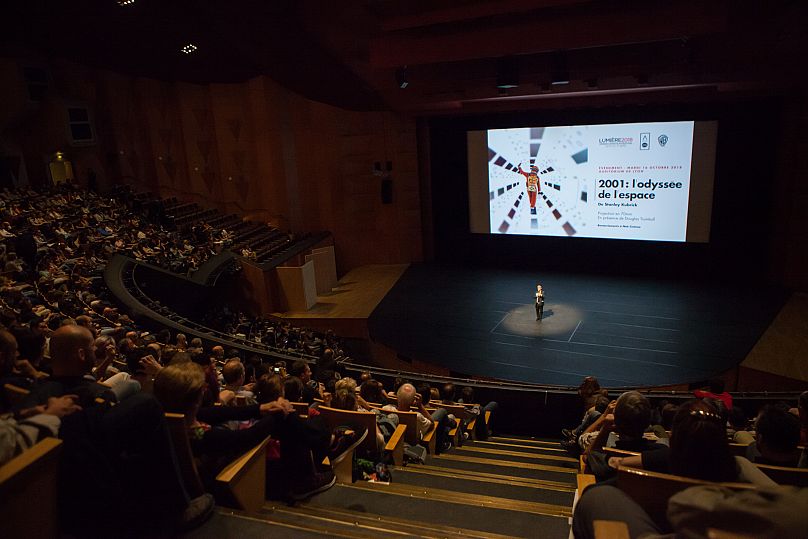50 years on, one of the key players behind the sci-fi classic 2001: A Space Odyssey has rewatched his visual effects work alongside an audience of 2,000 people in the French city of Lyon.
The debut of 2001: A Space Odyssey in 1968 changed the way sci-fi films were told with its out-of-this-world visual effects.
Fifty years on, one of the key players behind the movie's visual impact rewatched his work alongside an audience of 2,000 people in the French city of Lyon, as part of the annual Lumiere Film Festival.
Douglas Trumbull was only 23 years old when he started working on the film with Stanley Kubrick and has since been nominated three times for Oscars and has been honoured by the Society of Motion Picture and Television Engineers.
Trumbull's credits also include Star Trek: The Motion Picture, Blade Runner and, more recently, The Tree of Life.
Euronews: Do young people who watch 2001: A Space Odyssey today see it as something out of a museum or a piece of art that is relevant today?
Douglas Trumbull: I hope they see it right now as a piece of art because it still looks new. And it is spectacular and quite different from movies on your smartphone, tablet or television set. This is the big epic spectacle. And I hope that they look at it and say: “Wow, I could do that”. I hope they’ll want more of that giant screen.
Euronews: Could anyone really do it?
Douglas Trumbull: Anybody can do it. It's a mental process of the director: thinking big, thinking epic, trying to make a very large spectacle of some amazing place or some amazing thing.
Euronews: You said “2001” is still new. How?
Douglas Trumbull: In order to create this 70 millimetre kind of spectacular illusion that we did back 50 years ago, we can do that today digitally with any 4k camera. So you have high resolution and you can put it on a big screen. There are also 4k projectors and stereo sound systems. So a giant screen epic movie is there and it's inexpensive and easy. I hope more filmmakers want to do that.
Euronews: You worked on 2001: A Space Odyssey with Stanley Kubrick for more than 4 years. What are your fondest memories from that time?
Douglas Trumbull: Stanley Kubrick was a maverick and his personal filmmaking philosophy was to try to make movies that were different. His attitude was that if everybody's doing something in a certain way he wants to do it in another way. Do you want to invent some new way? Just shoot differently, tell the story differently and explore cinema as something other than just a normal storytelling format. He was a very adventurous filmmaker.
Euronews: Are there other directors that are doing the same right now?
Douglas Trumbull: No, I don't see many directors that are doing what Stanley Kubrick did in his lifetime. There are some directors that I admire who are exploring cinema. Like Alfonso Cuarón, who did “Gravity” which is quite a spectacular space film. He followed an adventurous way to make a film. He was a pioneer of exploring visual effects: computer photography, robotic cameras post-production techniques and animation for that movie. It was very successful and it broke a lot of rules. The camera never stopped moving and editing was completely different.
Chris Nolan is trying to do something different and he really admires Stanley Kubrick's work. He tried to replicate that to some extent in Interstellar and in Dunkirk, which is done more in like a David Lean-style, for a big epic giant screen.
Euronews: You were honored by the Society of Motion Picture and Television Engineers, and worked on UFO tracking tools. What you think is your life mission in cinema?
Douglas Trumbull: I put my career as a director aside for a while and I did that on purpose because I felt very disappointed with the medium of cinema. I felt that cinema was carrying a lot of old ideas, frame rates and old concepts of a rectangular cinematic frame. In my desire to make a more immersive cinema form I just stopped directing in order to solve some fundamental problems. I'm in the process of breaking of all the rules. I'm changing the frame rate, changing the resolution, changing the size of the screen, trying to bring a new kind of cinematic experience. I want to direct this new kind of movie to show the industry what that kind of experience it can be like and to go beyond “2001...”.
Euronews: Are you close to your achieving your goal?
Douglas Trumbull: I am! I have a wonderful screenplay. It's a big epic space adventure. Very, very beautiful. It's very scientifically valid, the way 2001 was. It will be a way to make the audience feel they are aboard of this spacecraft that is going out. Space is very beautiful and it’s a different place. I like exploring the unknown and pushing into a frontier of experiences that you've never seen or never imagined visually. That's why I love visual effects, that's the way you do it.
Lumiere Film Festival is held in Lyon for the 10th time this year, during October 13-21. It hosts hundreds of film screenings, two all-nighters, master classes with stars like Jane Fonda and Javier Bardem, cinema concerts, special opening and closing events, library, cinema market and even photographic exhibitions. Check out the highlights of the Festival Lumiere in pictures.












